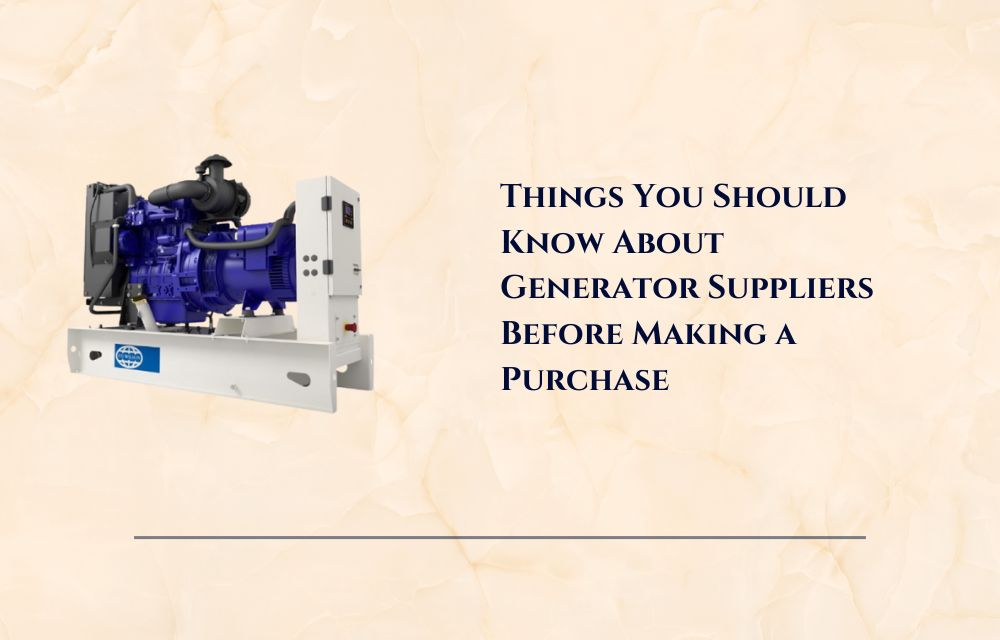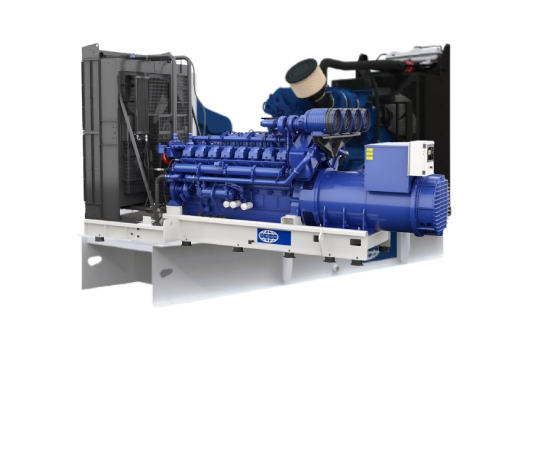
Generators are essential for providing backup power during outages, ensuring smooth operations for businesses, and supporting homes during emergencies. Whether you’re looking for a generator for your home or your business, selecting the right one is important. However, it’s not just about picking the generator—it’s also crucial to choose the right generator supplier. With so many options available, it can feel overwhelming. In this blog, we’ll go over the key things you should know about generator suppliers before making your purchase.
Why Choosing the Right Generator Supplier Matters
Before we dive into the specifics of what to look for, it’s important to understand why choosing a reliable generator supplier is essential. The right supplier can help ensure you get a quality product, excellent customer service, and ongoing support when you need it most. Poor customer service or unreliable products can leave you stranded during a power outage or with an inefficient solution that doesn’t meet your needs.
A good generator supplier will offer guidance, assist you in selecting the right generator for your specific needs, and provide maintenance and repair services down the line.
Factors to Consider When Choosing a Generator Supplier
Here are some important things to consider before selecting a generator supplier for your purchase:
Looking for reliable generator suppliers in UAE? Contact FG Wilson today! We provide high-quality, durable generators tailored to meet your business and industrial needs.
1. Experience and Reputation of the Supplier
When choosing a generator supplier, it’s important to research the company’s experience and reputation in the market. A supplier with years of experience is likely to offer better products, services, and advice.
You can assess a supplier’s reputation by:
- Checking reviews: Read online customer reviews to understand the experiences of other buyers.
- Asking for recommendations: Seek advice from friends, family, or business owners who have used generators before.
- Industry certifications: Look for suppliers with certifications or industry recognition that show they are trustworthy.
2. Range of Generator Options
Not all generators are the same. Depending on your needs, you may require different types of generators. A good supplier should offer a wide range of options, including:
- Portable generators: These are ideal for homes or small businesses that need temporary power during outages.
- Standby generators: These are more powerful systems that automatically kick in when the power goes out, providing backup for larger homes or businesses.
- Industrial generators: If you run a business or a large operation, you may need a heavy-duty generator capable of supporting multiple systems and machines at once.
A supplier with a wide variety of options allows you to select a generator that suits your specific needs, whether it’s for short-term or long-term use.
3. Generator Quality and Brand
Quality is one of the most important factors to consider when buying a generator. It’s crucial to choose a supplier that offers high-quality generators from reputable brands. A well-known brand will often have a better reputation for durability and reliability.
Look for suppliers that offer:
- Well-known brands: Brands like Honda, Cummins, Generac, and Yamaha are recognized for their high-quality, long-lasting generators.
- Warranty: A solid warranty can give you peace of mind that you are making a safe investment. Good suppliers will offer warranties to protect against defects or issues.
Choosing quality products reduces the risk of repairs or replacements in the future and ensures your generator will perform well when needed.
4. Customer Service and Support
Customer service is essential when selecting a generator supplier. A good supplier will not just sell you a product—they will provide support before, during, and after the purchase. Whether it’s helping you choose the right generator or offering repair services, customer service plays a big role in ensuring your experience is smooth.
Key customer service qualities to look for include:
- Pre-purchase guidance: The supplier should be able to explain the different generator models and help you choose the right one based on your needs.
- Maintenance and repair services: Ask if the supplier offers maintenance services and if they have certified technicians available to help with repairs.
- Technical support: A reliable supplier should offer customer support if you encounter issues with your generator in the future.
If you ever face problems with your generator, having a supplier that can provide fast and efficient support is invaluable.
5. Price and Financing Options
The price of a generator can vary greatly depending on the type, brand, and features. While cost is a big factor in your decision, it’s important to remember that the cheapest option may not always be the best in the long run. Sometimes, investing in a slightly more expensive generator can save you money on repairs or replacements down the line.
However, if you’re on a tight budget, many suppliers offer financing options to make the purchase easier. Some may provide:
- Installment payment plans: These allow you to spread the cost of the generator over several months.
- Leasing options: In some cases, you may even be able to lease a generator instead of purchasing it outright.
- Discounts or promotions: Check for seasonal discounts, promotional deals, or bulk pricing if you’re buying multiple generators.
While price is an important consideration, make sure to balance it with the quality and service the supplier provides.
6. After-Sales Services and Maintenance

Generators require regular maintenance to ensure they run smoothly and last a long time. After-sales services are crucial when buying a generator, as they can help you keep your equipment in top condition.
Look for suppliers that offer:
- Scheduled maintenance: Regular maintenance can help prevent breakdowns and extend the life of your generator.
- Emergency repairs: In case of a breakdown, make sure the supplier offers emergency repair services to get your generator back up and running quickly.
- Parts and accessories: Ask if the supplier can provide spare parts, filters, or other accessories for your generator, as these can wear out over time and need replacing.
Having access to a reliable after-sales service team can help you avoid long downtime and ensure your generator continues to perform well when needed.
7. Delivery and Installation Services
Once you’ve made your purchase, you’ll need to get your generator installed. Some suppliers offer delivery and installation services to make the process easier. This ensures that your generator is installed properly and safely, which can prevent any future issues.
- Delivery: Some suppliers will bring the generator directly to your location.
- Installation: The supplier may also help with the installation, making sure the generator is hooked up correctly and tested before use.
Choosing a supplier that offers these services can save you time and effort, and ensure that your generator is up and running as quickly as possible.
Conclusion
Choosing the right generator supplier is an important decision that can impact your business’s ability to stay operational during power outages, as well as the long-term reliability of your equipment. To make an informed decision, consider factors like the supplier’s experience, the range of products they offer, their reputation, and the quality of their customer service.
By carefully evaluating potential suppliers and asking the right questions, you can find a provider that will not only meet your needs but also offer ongoing support and reliable service. Whether you’re looking for a backup generator for your home or a powerful industrial generator for your business, taking the time to choose the right supplier will ensure that your investment is worth it.
Note:- To read more articles visit on ideaexpress.





Leave a Reply